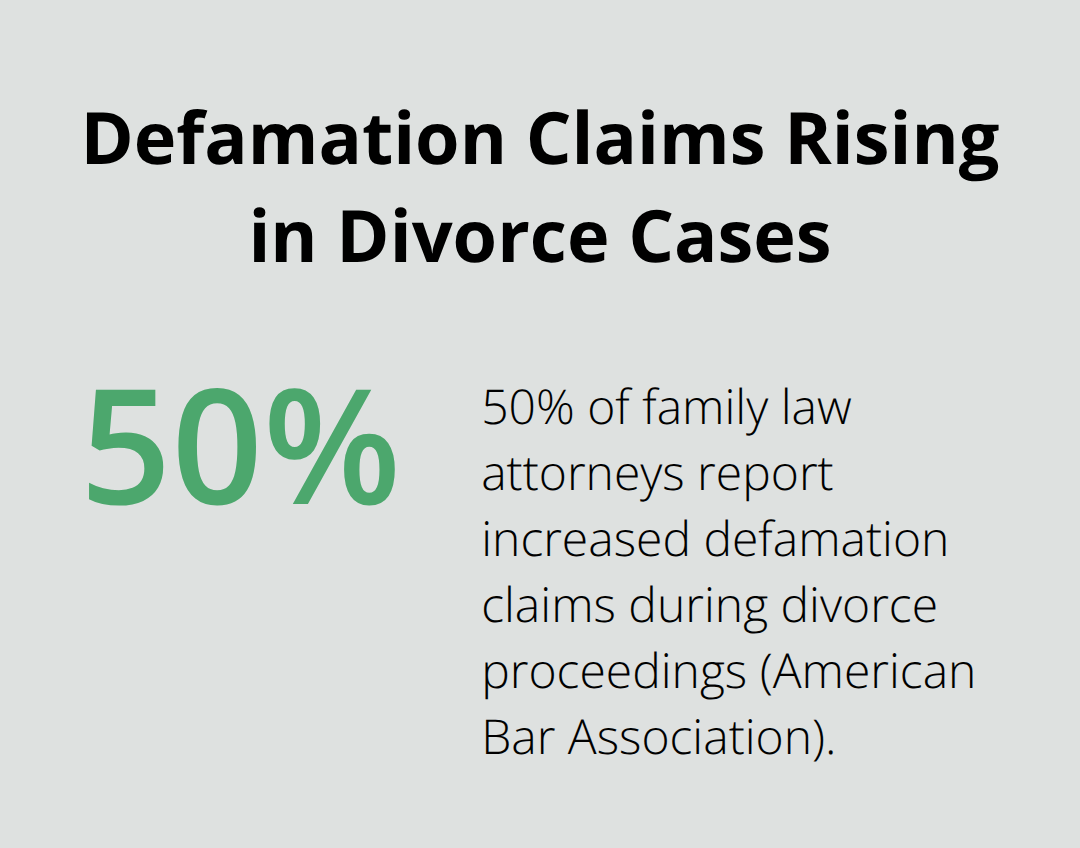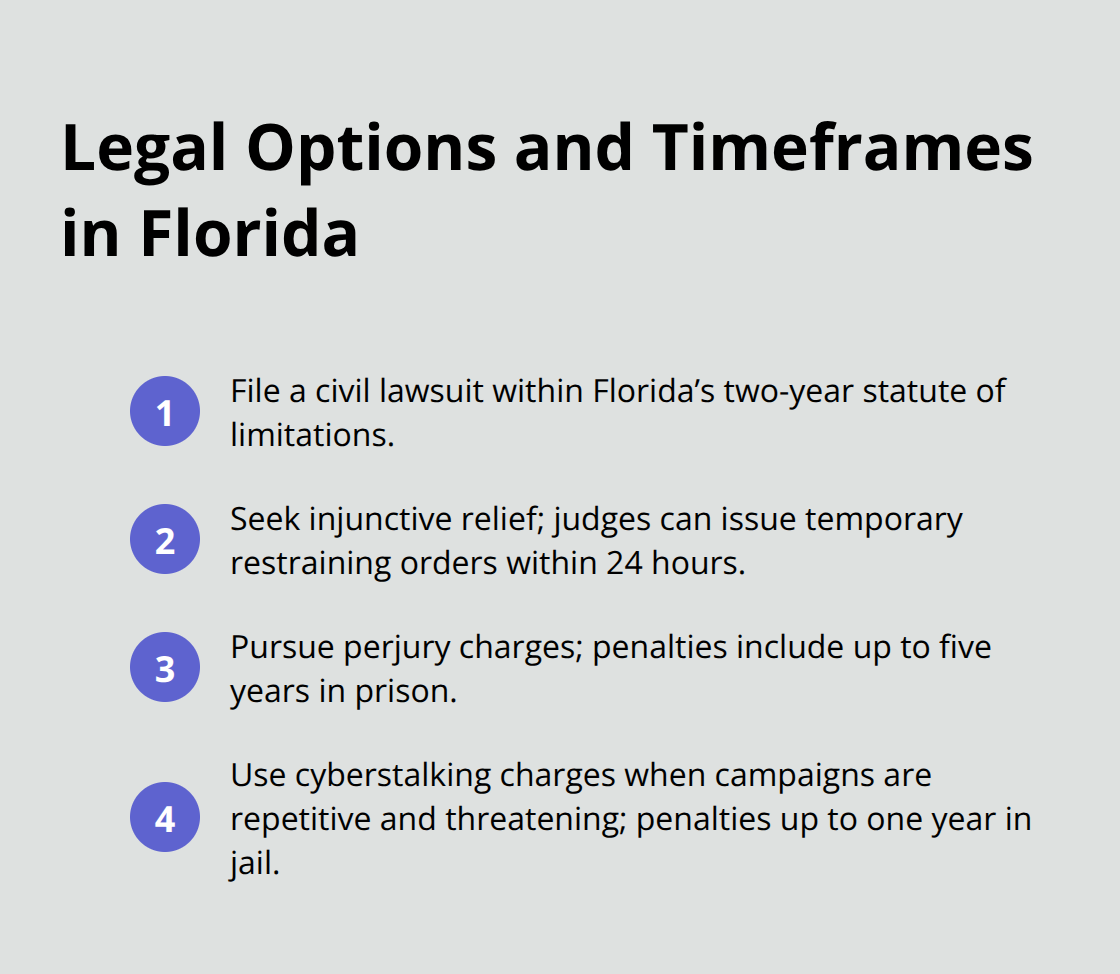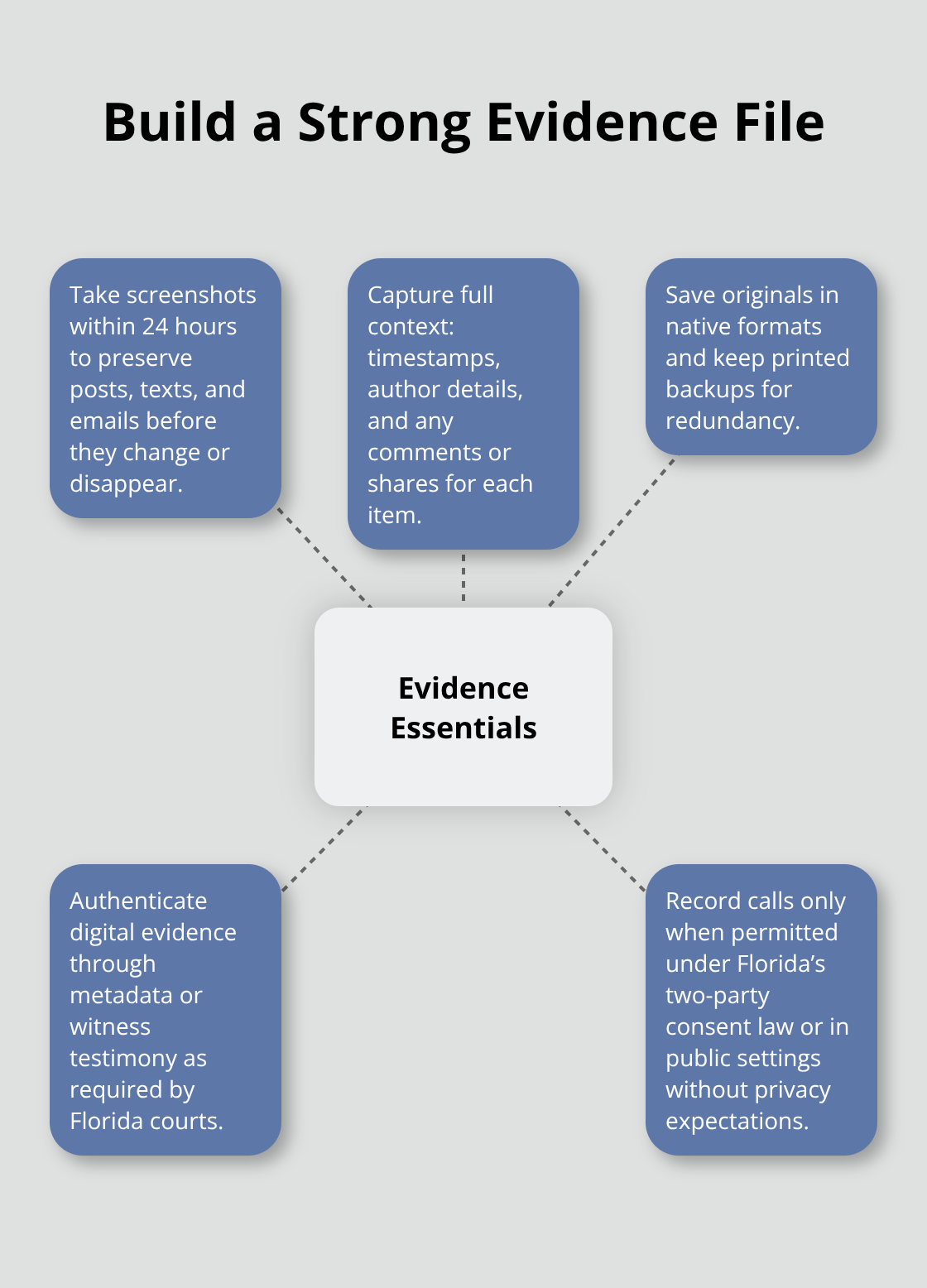Defamation of Character: How to Defend Your Reputation
Our Blog
Defamation of Character: How to Defend Your Reputation

False statements can destroy your reputation, relationships, and livelihood in divorce or custody battles. When someone spreads lies about your character, income, or parenting abilities, the damage spreads quickly through your community.
We at Harnage Law PLLC understand how devastating defamation can be during family disputes. Getting proper legal advice for defamation of character helps you fight back and protect what matters most.
Understanding Defamation of Character
Florida law defines defamation as a false statement presented as fact that harms your reputation and causes actual damage. The American Bar Association reports that 50% of family law attorneys see increased defamation claims during divorce proceedings. Courts require four elements: the statement must be false, communicated to at least one other person, cause harm to your reputation, and result in measurable damages like lost income or damaged relationships.

Difference Between Libel and Slander
Libel involves written or recorded false statements spread through texts, emails, social media posts, or court documents. Slander consists of spoken false claims made in conversations, phone calls, or public statements. Both forms carry equal legal weight in Florida courts, but libel often creates more damage because written statements reach wider audiences and remain accessible longer. False accusations of infidelity, abuse, or financial misconduct during custody battles frequently appear in both forms.
Elements Required to Prove Defamation
Florida courts place the burden of proof on you as the victim. You must establish that someone made a false statement about you to at least one other person. The statement must harm your reputation and cause actual damages (whether financial losses, damaged professional relationships, or custody impacts).
Document every instance with dates, witnesses, and exact statements made. Screenshot social media posts, save text messages, and record witness contact information immediately. The statement must be factually false – opinions like “I think he’s a bad parent” don’t qualify, but false claims like “He abuses our children” do.
Truth as an Absolute Defense
Truth serves as an absolute defense against defamation claims. Gather evidence that supports the falsity of claims made against you. Courts will dismiss cases where defendants can prove their statements were accurate, regardless of the harm caused to your reputation.
With these legal foundations established, you can explore the various legal remedies available to fight back against defamatory attacks.
Legal Options for Defamation Victims
Filing a Civil Lawsuit for Damages
A civil lawsuit for monetary damages provides your most powerful tool against defamatory attacks during family disputes. Florida courts award compensation for lost income, damaged business relationships, and emotional distress that false statements cause. Damage awards range from thousands to hundreds of thousands of dollars depending on the severity of reputational harm. You must file within Florida’s two-year statute of limitations from when someone published the defamatory statement. The lawsuit process typically takes 12 to 18 months, but many cases settle out of court once defendants realize the strength of your evidence.
Seeking Injunctive Relief to Stop Further Harm
Injunctive relief provides immediate protection when someone continues to spread lies about you during divorce or custody proceedings. Florida judges can issue temporary restraining orders within 24 hours of your petition, followed by preliminary injunctions that last throughout your case. These court orders legally prohibit the defendant from making further defamatory statements about you on social media, to mutual friends, or in public settings. Violators face contempt of court charges, which carry fines up to $1,000 and potential jail time.

This legal tool works particularly well against former spouses who repeatedly post false accusations online or spread rumors in your community.
Pursuing Criminal Charges When Applicable
Criminal charges become available when defamatory statements constitute perjury in court proceedings or involve threats and harassment. Florida prosecutors pursue perjury charges when someone makes false sworn statements during depositions or court hearings (with penalties that include up to five years in prison). Cyberstalking charges apply when defamatory social media campaigns become repetitive and threatening, with penalties up to one year in jail. Document every instance of harassment to build a strong criminal case alongside your civil lawsuit.
Success in any legal action depends heavily on the strength of evidence you present to support your claims.
Building a Strong Defamation Case
Strong evidence forms the foundation of every successful defamation lawsuit during family disputes. Take screenshots of every defamatory social media post, email, or text message within 24 hours of publication. Screenshots must capture the full context, including timestamps, author information, and any comments or shares. Save original emails in their native format and print hard copies as backup.

Florida courts accept digital evidence, but you need proper authentication through metadata or witness testimony. Record phone conversations only if Florida’s two-party consent law allows it, or if the conversation occurs in public where no expectation of privacy exists.
Gather Evidence of False Statements
Collect all forms of defamatory content systematically. Print social media posts before the author deletes them. Save voicemails that contain false accusations. Request copies of court filings that include defamatory statements. Store everything in chronological order with detailed notes about when and where you found each piece of evidence. Courts require original sources whenever possible, so avoid relying solely on second-hand reports from friends or family members.
Document Every Financial Impact
Track all measurable damages caused by false statements with precise documentation. Lost business income requires bank statements, tax returns, and client communications that show revenue drops after defamatory publications. Professional damage needs documentation from employers, colleagues, or clients who reference the false statements. Child custody impacts require court records that show reduced parenting time directly linked to false allegations. Medical bills for therapy or counseling related to emotional distress count as recoverable damages. Create a detailed timeline that connects each false statement to specific financial losses. Florida courts awarded an average of $47,000 in defamation damages during family law cases in 2024, but documentation quality determines your actual recovery.
Secure Credible Character Witnesses
Character witnesses provide powerful testimony that contradicts false allegations about your parenting, professional conduct, or personal behavior. Select witnesses who know you well and can speak to specific qualities under attack. Employers testify about work performance when false statements target professional reputation. Teachers, coaches, or pediatricians address parenting abilities when custody-related lies spread. Long-term friends counter character assassination attempts with concrete examples of your behavior. Prepare each witness with specific incidents that directly contradict the defamatory statements. Avoid family members as primary witnesses since courts view their testimony as potentially biased (professional references carry more weight than personal friends in Florida family courts).
Final Thoughts
Time works against you when defamatory statements spread through your community during family disputes. Florida’s two-year statute of limitations means you lose your legal options entirely if you wait too long. False accusations gain credibility when left unchallenged, which makes early intervention essential for your reputation and custody rights.
Legal action provides the most effective path to restore your good name after defamatory attacks. Civil lawsuits force defendants to publicly retract false statements and pay damages for the harm they caused. Injunctive relief stops defamation campaigns immediately, while criminal charges send a strong message that false accusations carry serious consequences.
Professional legal representation makes the difference between successful defamation cases and failed attempts. We at Harnage Law PLLC handle complex family law cases and civil litigation throughout Florida. Getting proper legal advice for defamation of character protects your reputation, your relationships with your children, and your financial future when false statements threaten everything you’ve worked to build (don’t let defamatory attacks go unanswered).
